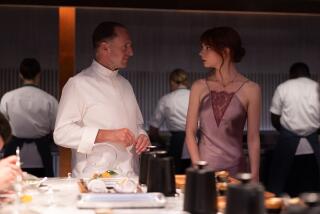Tummy love
- Share via
I don’t know when I’ve laughed so hard at such a poignant story as Nigel Slater’s boyhood, remembered almost entirely through the food he loved or hated in suburban 1960s England. No other account I’ve read of “normal” life in middle-class England -- not William Cooper’s marvelous “Scenes From Provincial Life” or Orwell’s “Keep the Aspidistra Flying” -- so vividly and hilariously conveys the essential grottiness and repression hidden behind the lace curtains of those pebble-fronted, semidetached houses that, next to royalty, most signify cozy British uptightness.
Slater, a food writer and popular television chef in Britain, is magnificently, diligently angry as he unreels his coming-of-age tale in short chapters, each titled with the name of a food evocative of what the English will tolerate in the realm of starved emotions and bad eating: Butterscotch Flavor Angel Delight, Fray Bentos Steak & Kidney Pie, Pickled Walnuts -- any ghastly comestible that is tinned, frozen and pressure-cooked so that “it always tastes of Irish stew.”
Readers familiar with current British cuisine -- all so Nigella Lawson and Jamie Oliver -- may balk at Slater’s description of the postwar Dark Age of Anglo-Saxon eating. But it’s bracing to be reminded how deeply rooted English taste is for uneatable dishes and how connected it is to class and sexual nervousness. The overlap in “Toast” between sex and food is abundant and explicit. If it tickles your palate, it’s “pure sex,” writes Slater.
“Toast” is about a lonely, sexually ambivalent adolescent, finicky about food but alert to dinner table meta-messages. Nigel loses, first, his asthmatic mother, a “chops-and-peas sort of cook” who (to his delight) burnt the toast, and then his father, an angry, impatient factory owner, “a crumpets and honey sort of man with a tight little mustache,” who is -- it’s implied -- killed off by the three-course lunches-plus-dessert his second wife forces on him. A sort of shepherd’s pie Grand Guignol.
Soon after the death of Nigel’s mother, Mr. Slater -- an older father who on evidence loathed his “nancy boy” son -- brings into the house “Auntie Joan,” a semiliterate, ciggie-smoking, blue-rinsed “cleaning woman” with whom he is sexually besotted. Later, Slater pere takes slatternly Joan as wife and cook. And right there is the son’s dilemma. Nigel passionately dislikes Joan, and she him, but she is a better cook than the dead mother. What is a boy to do whose raging hormones are fixated on food, in this battle between loyalty to his absent mum and obedience to his sensationally alive taste buds so disgustingly receptive to the Wicked Witch facile with a Kenwood blender?
One of the many nice things about Slater’s remarkably short and readable book -- half recipes, half nostalgia -- is that he manages simultaneously to poke gentle fun at his kitchen-helpless mother, slag off his beastly father, whose idea of a gourmet dinner is Heinz meatballs in gravy, and paint a shaded picture of Joan. A boy’s forgiveness can go no further than to praise a venomous stepmother who, “in a futile attempt to be middle class,” feeds young Nigel her idea of an upscale meal -- boiled gammon with parsley sauce and “creamed” (don’t ask) potatoes.
Part of the magic of “Toast” is the author’s surgically precise yet gentle way of giving us a painfully human story told via the fry pan and Aga cooker. At times I laughed myself silly at his Goyaesque food vignettes, because for decades in England I suffered from food unfit for human consumption. Deviled kidneys, Crosse & Blackwell salad cream (in china boats), Branston Pickle, Bovril, cheese footballs spiked on grilled grapefruit, Christmas cake that (literally) has to be eaten with hammer and chisel, bacon-wrapped prunes, liver and mashed swede -- oh God, the horror, the horror.
There is a happy ending. In his teens Nigel rescues himself through his version of pornography (cookbooks under the blanket) takes culinary college courses and goes off to London to find his destiny as an under-chef at the Savoy and ease into the gay demimonde around Piccadilly Circus. Among its many delights, his memoir is an easily digestible lesson in how to let your stomach heal your hungry heart. *
More to Read
Sign up for our Book Club newsletter
Get the latest news, events and more from the Los Angeles Times Book Club, and help us get L.A. reading and talking.
You may occasionally receive promotional content from the Los Angeles Times.










